|
|
|
Sort Order |
|
|
|
Items / Page
|
|
|
|
|
|
|
| Srl | Item |
| 1 |
ID:
161394
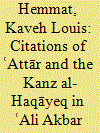

|
|
|
|
|
| Summary/Abstract |
ʿAli Akbar Khatāyi’s Khatāynāmeh (Book of China), a detailed description of state and society in Ming China written in 922/1516, includes citations from the Kanz al-Haqāyeq (attributed to Mahmud Shabestari) and ʿAttār’s Elāhināmeh. By citing these two texts at key points in his description of the Chinese government, Khatāyi articulates a radical political vision in which the civil officials, rather than the emperor, are the true rulers. Furthermore, by using the Kanz al-Haqāyeq as a portal text, and through frequent citations of other gnostic poetry, he crafts his own authorial presence by identifying his own text with fotovvat and gnosticism, and invokes a conceptual framework based on the thought of Ibn ʿArabi epitomized in his intertexts.
|
|
|
|
|
|
|
|
|
|
|
|
|
|
|
|
| 2 |
ID:
188494
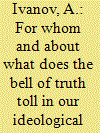

|
|
|
|
|
| Summary/Abstract |
TODAY, amid events unfolding in and around Ukraine that are pivotal to Russia and the entire world order, we hear more and more that "our strength is in truth" and "our cause is just." They are pronounced as a given, as something that requires no explanation, because they are part of our spiritual code. Today, we increasingly hear that Russia needs a national idea. The fact that the ideas of truth, a just cause, and patriotism resonate in our minds much louder during critical periods of Russia's history requires no explanation. This happened on the fateful day of June 22, 1941: "Our cause is just. The enemy will be defeated. Victory will be ours!"
|
|
|
|
|
|
|
|
|
|
|
|
|
|
|
|
| 3 |
ID:
142530
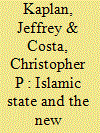

|
|
|
|
|
| Summary/Abstract |
This article focuses on the apocalyptic zeitgeist of the Islamic State through the lens of what we call the New Tribalism. It finds that IS emerged from the Al Qaeda (AQ) milieu, but soon split with AQ as the messianic excitement surrounding Al-Baghdadi and his teachings grew. In common with previous millennial/messianic movements in all three “Peoples of the Book”—Judaism, Christianity, and Islam—IS soon evolved beyond the laws of the normative faith (antinomianism). We hold that for this reason, despite its claims of faith and fealty, IS has left the Islamic Umah behind, becoming a malign sectarian group of its own whose dynamism and successes are attracting a global audience and support from Muslims in almost every country. This helps to explain such abhorrent practices as forced conversion, sexual servitude, the destruction of historic artifacts, and mass executions. We find that the American invasion of Iraq was the vital first step in a series of events, which gave birth to IS. A thorough review of IS history and political culture traces these historic moments in time.
|
|
|
|
|
|
|
|
|
|
|
|
|
|
|
|
| 4 |
ID:
177701
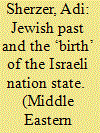

|
|
|
|
|
| Summary/Abstract |
The article focuses on David Ben-Gurion’s past image using a series of programmatic and widely distributed speeches he made during Israel’s first Independence Days (1948-1958). The article argues that while the founding of the state was defined as a turning point it was certainly not portrayed as a ‘beginning’, and that both the ancient sovereign and the exilic Jewish experience had a central place in Ben-Gurion’s relevant past. At the centre of discussion stand five main characteristics of the speeches: the continuation between the state and the Jewish ancient past; the central place of a secularized messianism as a bridge between the exilic past and the sovereign present; the attempt to portray a widely accepted shared past using consensus-based terminology; the simplification of the Zionist rebellion against the exile; and the fundamental differentiation between the Jewish symbolic past and the realistic Israeli present. These five elements are analysed against the background of other texts by Ben-Gurion and his image in the research. Finally, this case study is placed within a wider context which demonstrates the Israeli quest for a Jewish framework of meaning that would authenticate the new national myths and charge them with meaning.
|
|
|
|
|
|
|
|
|
|
|
|
|
|
|
|
| 5 |
ID:
157099
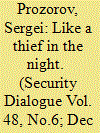

|
|
|
|
|
| Summary/Abstract |
The article addresses the reinterpretation of the problematic of security in the messianic turn in contemporary continental political thought. I focus on Giorgio Agamben’s reinterpretation of Hobbes’s Leviathan in Stasis, which restores an eschatological dimension to this foundational text of modern security politics. Hobbes’s commonwealth has been traditionally read as a secularized version of the katechon, a force that restrains the state of nature while drawing on its resources. Instead, Agamben argues that for Hobbes, the state is neither the analogue of God’s kingdom on earth nor the katechon that delays its arrival, but the profane power that will disappear when the kingdom of God is established on earth. It is thus in principle incapable of attaining the peace and security that it claims to provide, perpetually producing insecurity and violence in the guise of protection. In Agamben’s reading, it is precisely this failure of the state’s security apparatuses that assists the advent of the messianic event in an oblique fashion. The exposure of this failure does not aspire to the improvement of the apparatuses of security or resign us to inescapable insecurity but only affirms the need to render the present apparatuses inoperative, bringing forth a future without them.
|
|
|
|
|
|
|
|
|
|
|
|
|
|
|
|
| 6 |
ID:
168971


|
|
|
|
|
| Summary/Abstract |
The article aims to refute a long-standing thesis first put forth by Vladimir Minorsky about how the various copies of the dīvān of Shah Ismāʿīl might reflect shifts and changes in the religious and political landscape of early modern Iran. Contrary to the luminary Russian Orientalist’s claims, it demonstrates and contextualizes the observation that there were several textual traditions and that most of the copies continued to reflect messianism and “extremist” notions of religiosity well into late Ṣafavid times, appealing to a broad audience which was likely made up of Sufi adepts and nomadic Qizilbash, as well as a more refined echelon of courtly connoisseurs, residing in the borderland between the Ottoman lands and Iran. At the same time, it suggests that the main theme of Shah Ismāʿīl’s messianic poetry was sainthood and that in this sense Ṣafavid messianism was not a unique aberration but comparable and connected to such similar ideologies as are known from the Timurid, Ottoman or Mughal context.
|
|
|
|
|
|
|
|
|
|
|
|
|
|
|
|
| 7 |
ID:
172938
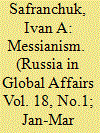

|
|
|
| 8 |
ID:
197238


|
|
|
|
|
| Summary/Abstract |
In this paper we analyse a situation wherein the political establishments of Russia and the United Kingdom, in the face of ontological insecurity, use narratives with messianic overtones in their foreign policies. Although these narratives do not feature prominently in the official discourse, they are nevertheless noticeable and provide a valuable insight into dynamics of national identity. We call them ‘mission narratives’ and interpret their (re)appearance in foreign policy as a reaction to a ‘critical situation’ which undermines the stability of the autobiographical narrative of both countries. Although different in scope and nature, the fall of the USSR and the Brexit referendum both resulted in the status and identity of the two states being questioned. Both countries reacted by emphasising their special role in the world. Referring to mission in foreign policy strengthens a coherent autobiographic narrative which soothes ontological uncertainties.
|
|
|
|
|
|
|
|
|
|
|
|
|
|
|
|
| 9 |
ID:
122062
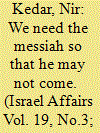

|
|
|
|
|
| Publication |
2013.
|
| Summary/Abstract |
In his speeches and writings as Prime Minister, David Ben-Gurion often used messianic language. In the late 1950s this policy evoked strong criticism in wide circles of the Israeli political and intellectual elite. The fear was that the combination of sweeping messianic ideas and Ben-Gurion's political might would inflict an irreparable blow to Israeli democracy. This article shows that, contrary to the claims of prominent Israeli intellectuals, Ben-Gurion's 'messianism' did not reflect a pretension to hasten the end of history but a desire to use the Jewish prophetic vision as a compass that would spur Israelis to express their human sovereignty and create a civilized society.
|
|
|
|
|
|
|
|
|
|
|
|
|
|
|
|
|
|
|
|
|